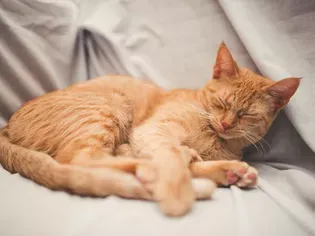What to Do if Your Cat Is Snoring
Updated on 04/26/24

What to Do if Your Cat Is Snoring: A Comprehensive Guide
Introduction
Snoring in cats, while not as common as in humans, can be a cause for concern for cat owners. While occasional snoring is usually not a cause for alarm, frequent or excessive snoring may indicate an underlying health condition that requires attention. This guide will delve into the causes of snoring in cats, its potential health implications, and the steps you can take to alleviate the issue and ensure your feline companion's well-being.
Causes of Snoring in Cats
* Obesity: Excess weight puts pressure on the cat's airways, causing them to narrow and vibrate, resulting in snoring.
* Nasal Allergies: Allergies to pollen, dust, or other irritants can cause inflammation and swelling of the nasal passages, obstructing airflow and leading to snoring.
* Nasal Polyps: These non-cancerous growths can form in the nasal passages and block airflow, causing snoring.
* Elongated Soft Palate: The soft palate at the back of the throat can become elongated and obstruct the airway, resulting in snoring.
* Tracheal Collapse: This condition occurs when the trachea, or windpipe, collapses, causing difficulty breathing and snoring.
Health Implications of Snoring in Cats
While occasional snoring is usually benign, frequent or excessive snoring can be a sign of a more serious underlying health condition. These conditions include:
* Respiratory infections: Snoring can be a symptom of respiratory infections such as feline upper respiratory infection (FURI) or feline asthma.
* Heart disease: Snoring may be a sign of heart failure, as fluid accumulation in the lungs can cause airway obstruction.
* Hyperthyroidism: This condition, caused by an overactive thyroid gland, can lead to weight loss, increased thirst, and snoring.
Steps to Take if Your Cat Is Snoring
If your cat is snoring, it's important to take the following steps:
* Observe the Frequency and Intensity: Note how often your cat snores and the loudness of the snoring. If it's frequent or loud, it may warrant further investigation.
* Check for Underlying Conditions: Look for other signs of health issues, such as coughing, sneezing, difficulty breathing, or weight loss. If you suspect an underlying condition, consult your veterinarian promptly.
* Manage Weight: If obesity is the cause of snoring, work with your veterinarian to develop a weight loss plan for your cat.
* Rule Out Allergies: If you suspect allergies, try to identify potential allergens and minimize your cat's exposure to them. Consider using hypoallergenic litter and cleaning your home regularly.
* Consult Your Veterinarian: If you're concerned about your cat's snoring or suspect an underlying health condition, schedule an appointment with your veterinarian. They will examine your cat, perform tests, and provide appropriate treatment recommendations.
Treatment Options
Depending on the underlying cause, your veterinarian may recommend various treatment options, including:
* Medication: Antibiotics for respiratory infections, steroids for allergies, or medications to manage heart failure.
* Surgery: In cases of elongated soft palate or tracheal collapse, surgical intervention may be necessary.
* Weight Management: Prescription diets and exercise plans to help your cat lose weight and reduce airway obstruction.
* Environmental Modifications: Reducing exposure to allergens or using nasal saline sprays to clear nasal passages.
When to Seek Emergency Care
In some cases, snoring in cats can be a sign of a medical emergency. Seek immediate veterinary care if your cat is:
* Snoring excessively and struggling to breathe
* Wheezing or coughing persistently
* Displaying bluish gums or lips
* In evident distress
Conclusion
Snoring in cats can be a common occurrence, but it's important to be aware of its potential causes and health implications. By observing your cat's snoring patterns, checking for underlying conditions, and seeking professional advice when necessary, you can ensure your feline friend receives appropriate care and enjoys a healthy, comfortable life.
Explore More Pets

Cat Behavior Problems
How to Stop Aggression in Kittens

Long-Haired Cat Breeds
Siberian Cat: Breed Profile, Characteristics, & Care

Cat Behavior Problems
How to Stop Kittens From Scratching and Biting

Long-Haired Cat Breeds
Turkish Angora: Cat Breed Profile, Characteristics & Care

Basic Training
How to Socialize Your Kitten

Short-Haired Cat Breeds
Cute Pictures & Facts About Calico Cats & Kittens

Litter Box Training
Training Your Kitten to Use the Litter Box

Long-Haired Cat Breeds
10 Fun Facts About White Cats